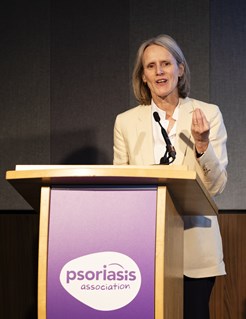
05 April 2024
The Triggers of Psoriasis And How To Treat It - Article Q&A
Marina Gask from the Telegraph, interviewed Professor Catherine Smith consultant dermatologist, for a piece on The triggers of psoriasis and how to treat it.
The article covers what psoriasis is, common triggers and Marina also discusses her personal experience of living with psoriasis.
The full article is available to read on the Telegraph online, and a summary of Professor’s Smith’s Q&A can be found below:
What are the lifestyle triggers for psoriasis?

“Major life events and stressful incidents can trigger psoriasis in some people. And there can be a lot of judgement around that – people saying: ‘You’re just stressed, you need to relax,’ when really it’s not as simple as that,” says Prof Smith.
“We also know that among people with psoriasis, there is prevalent alcohol dependence and misuse, and it’s a bit of chicken and egg thing, because severe psoriasis has a huge impact on people’s lives,” so their alcohol misuse may well be driven by distress over their psoriasis.
Food and diet triggers
There are lots of studies which explore the link between psoriasis and diet. “Avoid excess alcohol and processed foods and eat lots of fruit and vegetables,” says Prof Smith. On our forums, lots of people share tips and tricks about diet changes which have positively impacted their psoriasis.
Environmental triggers
“Research is ongoing to understand how our genes interact with the environment and to identify the other triggers,” says Prof Smith.
Seasonal changes can impact your skin due to the changes in humidity, heat, cold, wind and sunlight. It’s important to monitor your skin throughout the year and make amendments to treatments accordingly.
Is psoriasis genetic?
The role of genetics in psoriasis is not fully understood. Some people will have a family history of the condition. Prof Smith says, “If you’ve got a positive family history, that’s one indicator of your likely genetic burden, and if you’ve inherited a lot of the areas in the genome that increase your susceptibility to psoriasis, you are more likely to have it severely”.
What treatments are available for psoriasis?
At current, there is no known cure for psoriasis however, Prof Smith states “There’s every reason to be optimistic. Driven by a greater understanding of the molecular drivers of the disease, we now have some incredibly good treatments”.
“For people with more extensive disease there’s been a complete step change, with the development of immunomodulatory therapies and biologics. These drugs are designed to target the pathways that are dysregulated or overactive in psoriasis”.
Psoriatic arthritis (PsA) is an inflammatory arthritis associated with psoriasis. Psoriatic Arthritis affects joints (such as the knees or those in the hands and feet), as well as areas where tendons join to bone (such as the heel and lower back).
mySkin Study
Professor Catherine Smith alongside Dr Satveer Mahil, are part of the team at St John’s Institute of Dermatology at Guy’s Hospital, King’s College London running the mySkin, survey which examines psoriasis in the UK. Visit myskin.org to get involved.
Credit to The Telegraph online The triggers of psoriasis and how to treat it – Marina Gask.